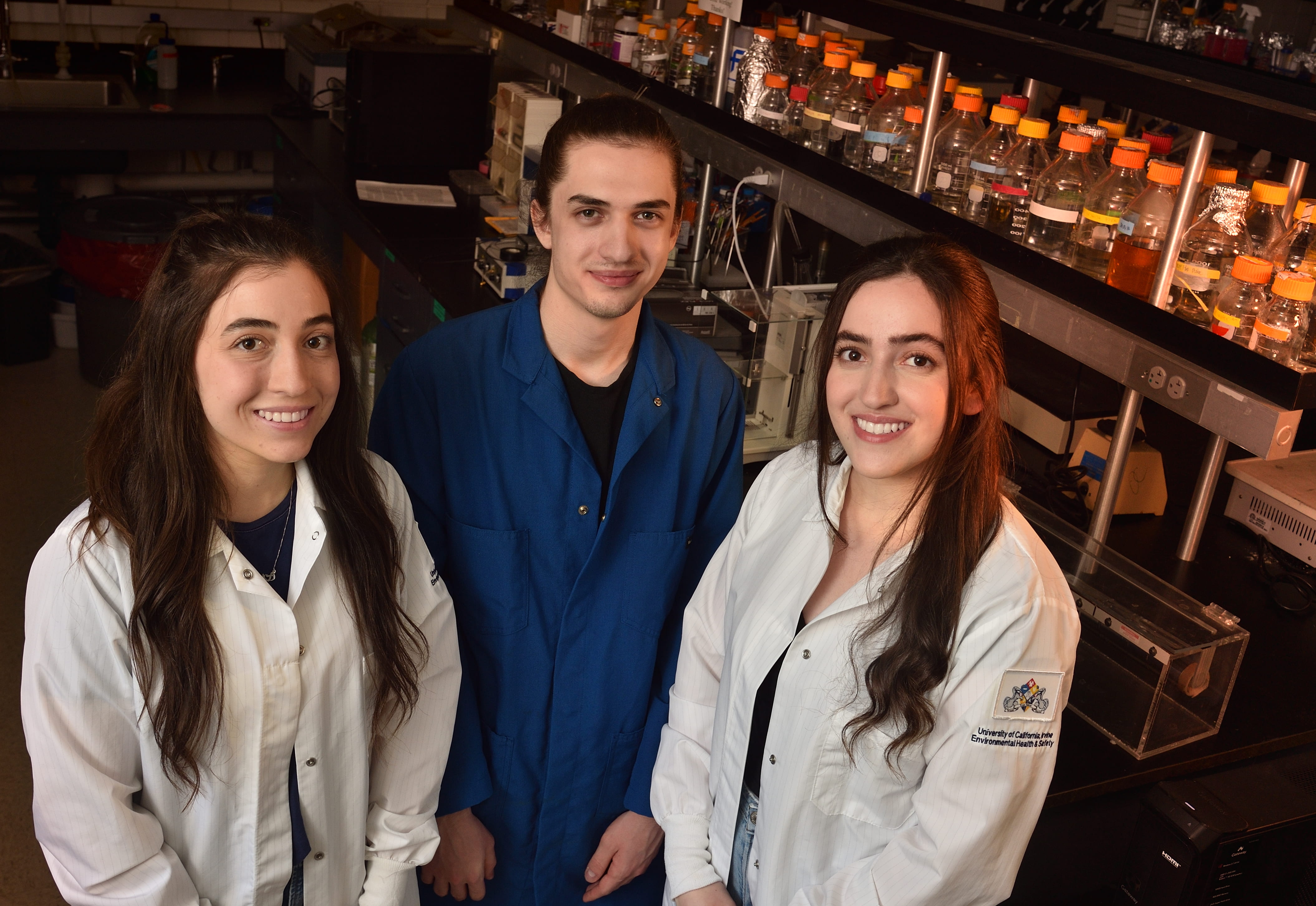Single-minded siblings
Lamees, Wedad and Sammy Alhassen are all doctoral students in UCI’s new School of Pharmacy and Pharmaceutical Sciences

They’re known around UCI as “the three siblings” – two sisters and a brother who not only share an on-campus apartment, but also work as doctoral students in two labs at the new School of Pharmacy and Pharmaceutical Sciences.
It’s an unprecedented situation, perhaps, in the annals of UCI, but for the Alhassen siblings, it feels normal.
The trio, after all, attended elementary, middle and high school together and, for a year, crossed paths at UC Riverside as undergraduates, commuting from their home in West Covina in a white Ford Focus.
And they’ve all chosen the same discipline: pharmacology.
“I’ve always been interested in math,” says Sammy Alhassen, the baby of the family. “But I’ve always wanted to do something with science as well, so this is the perfect marriage.”
The offspring of a mother from Germany and a father who emigrated from Syria to the U.S. when he was 21 and became an architect, instilling in his eight children the importance of education, Lamees, Wedad and Sammy Alhassen are used to doing everything together – from supporting each other in their research to shooting hoops and sharing household duties.
Lamees Alhassen, 26, and Wedad Alhassen, 25, love to cook, bake and paint. Sammy Alhassen, 23, is the go-to person for tech issues. Four of the trio’s five older siblings are engineers – environmental, civil, structural and aerospace.
Parallel paths
“Our whole family is very, very close,” says Lamees Alhassen during a recent break in the campus labs run by Amal Alachkar, an associate professor in pharmaceutical sciences, and Olivier Civelli, the Eric L. and Lila D. Nelson Chair in Neuropharmacology.
“Family and education have always been the most important things in our lives,” she adds. “And I think [the three of us have] grown closer because we share a similar passion in the same field of study.”
The siblings all earned bachelor’s degrees in biomedical engineering at UC Riverside and then obtained master’s degrees – Lamees Alhassen in pharmacology at UCI, Wedad Alhassen in biomedical engineering at UC Riverside, and Sammy Alhassen in biomedical engineering at UC Berkeley.
Shortly after getting her undergraduate degree, Lamees Alhassen met Alachkar through the friend of an aunt. After touring Alachkar’s lab in UCI’s Medical Surge II building, she began to work there while enrolled in the newly created online master’s program in pharmacology.
She has since toiled on countless projects with both Alachkar and Civelli and recommended that her brother and sister join her. They all moved in together in the summer of 2018 and that fall, Wedad and Sammy Alhassen started the Ph.D. program in pharmacological sciences at UCI. Lamees Alhassen began her doctoral studies the following fall.
The research in Civelli’s and Alachkar’s labs is deeply rooted in the pharmacology of the brain. Alachkar focuses on the neurobiology of neurological and psychiatric disorders and identifying therapeutic targets for optimal treatment.
Civelli aims to increase understanding of the diversity of brain functions by studying novel molecules that mediate synaptic transmission.
Drug discovery research is an important part of the new School of Pharmacy and Pharmaceutical Sciences. Along with training tomorrow’s pharmacy leaders, it’s producing the next generations of pharmaceutical scientists.
Resourceful researchers
“The Alhassens are highly self-motivated students and full of energy,” Alachkar says. “They’re creative. They use their bioengineering knowledge to find solutions for their research questions in pharmacology. It’s fun to work with them.”
Lamees Alhassen, who reports to Civelli, is currently studying a plant extract called Corydalis yanhusuo, which she breaks down to learn how it can be used with pain medications to reduce the likelihood of dependency.
“Opioids like morphine are the gold standard for pain treatment,” she says. “But they come with bad side effects and are highly addictive.”
Wedad Alhassen, who reports to Alachkar, is mapping brain circuits to find out how they relate to schizophrenia. “We’re doing this in the hope that eventually we can develop new therapeutics,” she says.
Sammy Alhassen, also one of Alachkar’s graduate students, is working on projects involving mental and movement disorders that could shed new light on certain chemicals in the human body. His main focus is pursuing treatments and a possible cure for Parkinson’s disease.
The Alhassens say their tight relationship benefits their research.
“I’ve had a lot of discussions with other graduate students in different disciplines, and they always mention how challenging it is to deal with the stress that comes with graduate school,” Lamees Alhassen says.
“I would do anything for my family,” she adds. “If I see my sister struggling in any aspect of research, I’m always willing to help. Also, it’s a stress reliever when you always have someone you can sit down and openly talk to.”
Alachkar agrees.
“While they work efficiently and independently on their doctoral research, their support of each other plays a key role in alleviating any of the psychological distress experienced by many Ph.D. students,” she says. “And they’re generous in their emotional and technical support of other doctoral students in the same program.”